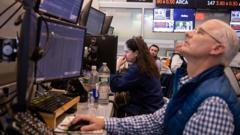On Wednesday, US stock markets experienced unprecedented growth after President Donald Trump announced a pause on steep tariffs on goods from several nations. The S&P 500 saw its largest one-day increase since 2008, elevating it by 9.5%, amid a series of rapid market changes.
US Markets Surge as Trump Halts Select Tariffs

US Markets Surge as Trump Halts Select Tariffs
US stock indices experience significant gains following President Trump's decision to suspend some tariffs while imposing a lower import tax rate.
While rallying investor confidence, the White House explained that the decision to relax tariff pressures came as part of efforts to negotiate with trading partners. However, Trump declared that tariffs on China would be escalated to at least 125% immediately. These developments unfolded after the initial round of tariffs took effect, which particularly impacted countries like Vietnam, facing new import levies.
Prior to Trump's announcement, the markets were rattled, with the S&P dropping over 10% amid fears of a looming economic recession. The warnings had also seeped into the bond markets, compelling investors to withdraw from US government securities. Paul Ashworth, an economist, commented on the shifting tide, suggesting the likelihood that Trump would revert to his proposed universal 10% tariff in future dealings, despite extensive negotiations still being imminent.
The significant market recovery on Wednesday saw the Dow rising over 7.8% and the Nasdaq climbing more than 12%, with major corporations like Nike and Apple experiencing stock price spikes upwards of 11% and 15%, respectively. Despite this rally, major indices remain below pre-announcement levels, with S&P down approximately 3% year-to-date.
Trump's tariffs particularly affect China, which constituted America's third-largest source of goods, responsible for over $400 billion in trade last year. The tariffs have prompted the National Retail Federation to predict a potential 20% decrease in shipments via US ports compared to the previous year, suggesting profound implications for import dynamics.
In his follow-up remarks, Trump indicated a commitment to negotiate with China and hinted at potential tariff exemptions for individual businesses, signaling a more adaptable stance than previously suggested. His decision came amidst mounting political pressure from allies and influential figures like Elon Musk and Bill Ackman, who emphasized the importance of a 90-day tariff suspension.
Goldman Sachs also reacted to Trump's announcement, switching its forecast from predicting a recession due to the newly announced tariffs to a more tempered outlook, although it still anticipated limited economic growth. Ackman praised Trump's actions on social media, expressing gratitude on behalf of American citizens.
Overall, the fluctuating tariff policies are key to understanding the future landscape of trade relations and stock market stability as tensions continue between the US and its major trading partners.
Prior to Trump's announcement, the markets were rattled, with the S&P dropping over 10% amid fears of a looming economic recession. The warnings had also seeped into the bond markets, compelling investors to withdraw from US government securities. Paul Ashworth, an economist, commented on the shifting tide, suggesting the likelihood that Trump would revert to his proposed universal 10% tariff in future dealings, despite extensive negotiations still being imminent.
The significant market recovery on Wednesday saw the Dow rising over 7.8% and the Nasdaq climbing more than 12%, with major corporations like Nike and Apple experiencing stock price spikes upwards of 11% and 15%, respectively. Despite this rally, major indices remain below pre-announcement levels, with S&P down approximately 3% year-to-date.
Trump's tariffs particularly affect China, which constituted America's third-largest source of goods, responsible for over $400 billion in trade last year. The tariffs have prompted the National Retail Federation to predict a potential 20% decrease in shipments via US ports compared to the previous year, suggesting profound implications for import dynamics.
In his follow-up remarks, Trump indicated a commitment to negotiate with China and hinted at potential tariff exemptions for individual businesses, signaling a more adaptable stance than previously suggested. His decision came amidst mounting political pressure from allies and influential figures like Elon Musk and Bill Ackman, who emphasized the importance of a 90-day tariff suspension.
Goldman Sachs also reacted to Trump's announcement, switching its forecast from predicting a recession due to the newly announced tariffs to a more tempered outlook, although it still anticipated limited economic growth. Ackman praised Trump's actions on social media, expressing gratitude on behalf of American citizens.
Overall, the fluctuating tariff policies are key to understanding the future landscape of trade relations and stock market stability as tensions continue between the US and its major trading partners.


















